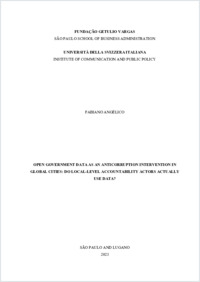Open government data as an anticorruption intervention in global cities : do local-level accountability actors actually use data?
- Angélico, Fabiano
- Cunha, Maria Alexandra (Degree supervisor)
- Villeneuve, Jean-Patrick (Degree supervisor)
- 2023
PhD: Università della Svizzera italiana
Open data
Transparency
Open government data
Accountability
Data use
Corruption
Public sector
Data for development
Local governments
English
Transparency and open data are regarded as means for improving governance, including control of corruption. For this reason, there has been an explosion of access to information laws and open data portals in the last 25 years. However, a crucial aspect of the interrelation between open government data and corruption control is still understudied: data use. This thesis investigates the uses and barriers to the use of open government data to counter corruption in a megacity — São Paulo, the largest city in Brazil and South America — focusing on a dataset that the local government made publicly available for six years (2016-2022): urban land and real estate ownership. This thesis builds upon various source, including documentation and semi-structured interviews. From document analysis and direct experience, followed by validation with knowledgeable actors, it has been noted that accountability organizations, both from civil society and government, have not systematically used the urban land real estate dataset as anticipated. In-depth interviews with 20 top-level accountability actors, totaling nearly 16 hours, have been conducted to investigate these professionals’ perceptions about data access and use. The results show that the disclosure of the dataset informing details about urban land and real estate, such as the name of property owners, has had limited use on corruption control. Building upon the concept of “publicity and accountability condition” (Lindstedt & Naurin, 2010) to assess the relationship between transparency and corruption added to elements of historical institutionalism, I propose the concept of “socio-political and techno-legal conditions” for analyses of open data use on producing desired outcomes toward corruption control. The disclosure of data will not bring about expected and desired effects unless there are: i) social consensus around the value of integrity and political incentives towards anticorruption institutional building and ii) technical and legal conditions for effective data use for legal and administrative sanctioning mechanisms. This thesis contributes to theory building in three ways: the emerging literature on open data; the academic debate on the conceptualization and mis-conceptualization of corruption; and the scientific knowledge on local-level corruption. Regarding practice, this thesis argues for more sophisticated designs of transparency and open data policies for accountability, particularly at the subnational level.
- Collections
- Language
-
- English
- Classification
- Politics
- License
-
License undefined
- Open access status
- green
- Identifiers
-
- NDP-USI 2023COM002
- URN urn:nbn:ch:rero-006-119879
- ARK ark:/12658/srd1325051
- Persistent URL
- https://n2t.net/ark:/12658/srd1325051
Statistics
Document views: 597
File downloads:
- 2023COM002: 564
